2022 NEWSLETTER BIOLOGY AT IOWA





Dear Alumni and Friends,
Greetings from the Department of Biology! I am very pleased to serve as the interim chair of the department and have greatly enjoyed working with all of the wonderful faculty, students, and staff over the past year. I am also excited to announce that Professor Tina Tootle will take over as the chair of the department starting July 1, 2023. We will be working together over the next several months to ensure a smooth transition in leadership.
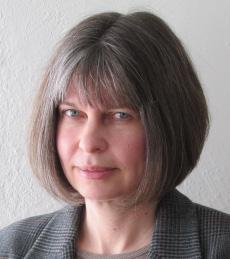
Biology continues to be a top draw for recruiting undergraduate students to the College of Liberal Arts and Sciences and serves as a hub for students interested in pursuing careers in science and medicine. We provide amazing hands-on learning opportunities for students across all levels of the curriculum, including working in faculty labs to gain world-class research experience. We again welcomed a set of students this past summer who did research internships with faculty through our NSF-funded Interdisciplinary Undergraduate Research in Evolution REU site led by Dr. Andrew Forbes.
Faculty and students continue to generate cutting-edge research across a wide variety of areas in the biological sciences, from identifying aging-resilient neural circuits to quantifying species-richness of parasitic wasps. We were especially pleased that Dr. Anna Malkova was named the Roy J. Carver Professor in recognition of her exceptional research accomplishments and that the prestigious Rex Montgomery Dissertation Prize was awarded to Dr. Beth Osia, a former iBio PhD student. Biology continues to lead in providing outstanding research opportunities for underrepresented students through the leadership of Dr. Lori Adams, who was recently named the Director of Science Engagement in the College of Liberal Arts and Sciences.
Needless to say, the accomplishments in the Department of Biology across all of our endeavors are greatly facilitated by the support of our generous alumni and friends. We look forward to sharing more about these accomplishments in this issue of the newsletter.
Prospective Undergraduate Students

In February 2022, the Department of Biology hosted an undergraduate recruiting event inviting selected prospective students and their guests to learn about the various programs in Biology, hear from current students about their experiences, and receive a tour of the department.
Prospective students interested in visiting campus and the Department of Biology can go to admissions.uiowa.edu or call 319-335-1566 to schedule a time.

 Jodie Plumert, Ph.D. Interim Chair/Departmental Executive Officer (DEO)
Jodie Plumert, Ph.D. Interim Chair/Departmental Executive Officer (DEO)
@uiowabiology @uiowabiology biology.uiowa.edu biology@uiowa.edu (319) 335-1050 Connect with us! 2022 Newsletter I 1
Funding Highlights
ROY J. CARVER CHARITABLE TRUST
Supports Department of Biology
The Roy J. Carver Charitable Trust, one of the largest private philanthropic foundations in the state of Iowa, has made significant contributions to the Department of Biology throughout its history. In 2021, the Carver Charitable Trust awarded a $221,962 grant to expand the equipment in the two research service centers in the Department of Biology, the Roy J. Carver Center for Genomics (CCG) and the Roy J. Carver Center for Imaging (CCI). This new equipment will provide high throughput, accurate, and quantitative analyses at the molecular and cellular/tissue level.
The new equipment in the CCG including the Agilent BioAnalyzer 2100, BluePippin, QuantStudio 3 qPCR System (QS3), Qubit 4 Fluorometer, and Illumina iSeq 100 will provide high quality samples and allow investigators to report on how systems respond to change. For example, the QS3 is a critical tool in gene expression studies. This machine will be used to study gene expression in different species, different cells, at different life stages, and under different stress conditions, in order to draw conclusions about biological resilience and has already been utilized by several research labs. The iSeq will complement current and new equipment in the CCG in a way that will allow important synergies, accelerate research, and generate new and impactful discoveries.

The funds from this grant also allowed an upgrade to key elements in the Cytation 5 and new accessories that will exploit the full potential of this instrument. The Cytation 5, a combination microscope and plate reader, has accelerated research progress and inspired new projects that otherwise would not have been possible such as measuring changes in cell morphology in greater microscopic depth and capacity. The new Leica CM3050 S Cryostat will enable rapid and consistent tissue processing for a wider range of tissue types. Importantly, tissue sections processed with this equipment can be rapidly analyzed with the Cytation 5 and the sophisticated confocal microscopes in the CCI. For more information about the CCG and CCI and available equipment, please visit biology.uiowa.edu/ccg and biology.uiowa.edu/cci
Biology Professor Named Roy J. Carver Professor
Professor Anna Malkova was named Roy J. Carver Professor effective July 1, 2022. This named professorship is a five-year appointment in recognition of Dr. Malkova’s outstanding research and scholarly contributions that she has brought to the Department of Biology, the College of Liberal Arts and Sciences, and the University of Iowa.

FUNDING HIGHLIGHTS
Lori Adams, Associate Professor of Instruction in Biology and Director of the Iowa Sciences Academy, Josep Comeron, Professor of Biology, Veena Prahlad, Associate Professor of Biology, and Anna Malkova, Roy J. Carver Professor of Biology, along with researchers from the College of Public Health and the Carver College of Medicine, received a $500,000 Interdisciplinary Scholars award from the UI Office of the Vice President for Research to begin work on a new project at the intersection of climate, the environment, and health. The team will investigate the effect of the diverse environmental stressors affected by climate change on the unique health challenges of rural people.
Daniel Eberl, Professor of Biology and Director of the Interdisciplinary Graduate Program in Genetics: $1,522,890 for five years for a T32 Research Training Grant from the National Institutes of Health (NIH) to continue funding the Predoctoral Training Program in Genetics. This training grant will support 7 predoctoral trainees each year with allowance for conference travel and some programming funds to support program-wide training efforts of the Interdisciplinary Graduate Program in Genetics.
Merve Addemir (Summers Lab) using the Cytation 5
2 I Department of Biology • biology.uiowa.edu
Anna Malkova (left) along with CLAS Dean Sara Sanders
Maurine Neiman, Professor of Biology: $407,042 for three years from the National Science Foundation to continue “REU Site: Engaging Undergraduates in Interdisciplinary Evolutionary Science.”
of Biology,
in the
Lab: $1,332,060 from the U.S. Department of Defense Congressionally Directed Medical Research Program for “Preclinical development of use-dependent, selective blockers of GluA2-lacking AMPA receptors to prevent noise-induced neurodegeneration.” Dr. Green also received a subaward for five years in the amount of $264,780 from the National Institutes of Health for “Excitability and Excitotoxicity in Type-1 Cochlear Afferents: Synapse Structure and Function.” Mark Rutherford from Washington University School of Medicine in St. Louis is the Principal Investigator on this grant.
Anna Malkova, Roy J. Carver Professor of Biology, and Josep Comeron, Professor of Biology: $1,529,122 for five years from the National Institutes of Health (NIH) for “Genetic and environmental factors affecting alternative lengthening of telomeres.” Dr. Malkova was also awarded a $98,998 equipment supplement for her NIH grant “Double strand break repair maelstrom: causes, mechanisms and genome destabilizing consequences.”
John Manak, Professor of Biology: $41,000 from the University of Iowa Stead Family Children’s Hospital and the Stead Family Department of Pediatrics Research Grant Program for “Uncovering a connection between innate immune system activation and epilepsy.”
“A
trematode parasite.” The UI OVPR
of
Veena Prahlad, Associate Professor of Biology and Principal Investigator, along with collaborator Josep Comeron, Professor of Biology, were awarded $1,865,042 for five years from the National Institutes of Health (NIH) for “Investigating how stress induced changes in maternal serotonin affect offspring development and stress resilience.” Dr. Prahlad, along with Rocio Gomez-Pastor (University of Minnesota) were awarded $439,188 from NIH for two years for “Role of serotonergic-activation of heat shock transcription factor in the regulation of age-related protein misfolding and toxicity in mammalian systems.” Dr. Prahlad also received $49,500 from NIH for “Metabolism, Aging, Pathogenesis, Stress and Small RNAs Meeting.” Dr. Prahlad was also a member of a team selected by the Iowa Neuroscience Institute (INI) at the University of Iowa to carry out a Research Program of Excellence over the next three years. The INI awarded a total of $2.4 million to four research teams. Dr. Prahlad’s team, “Sleep, Mood, and Arousal in Alzheimer’s disease and Lewy Body Dementia: Serotonin Hypothesis (SMASH),” seeks to identify the anatomical origins of specific proteins that accumulate in the brain as well as clinical biomarkers of early-stage disease in patients with Alzheimer’s and Lewy body dementia.
Drs. Prahlad, Comeron, and Malkova were selected for funding in the amount of $40,000 for a one-year pilot grant from the UI Environmental Health Sciences Research Center entitled, “Identifying conserved ncRNAs that trigger stressinduced epigenetic changes.”
Christopher Stipp, Associate Professor of Biology and Principal Investigator, along with Co-Investigator Adam Dupuy (UI Department of Anatomy and Cell Biology): $772,480 for three years from the U.S. Department of Defense Congressionally Directed Medical Research Program for “Delineating Novel Molecular Pathways Critical for the Growth of GNAQ/11-Mutant Uveal Melanoma Cells.”
Daniel Summers, Assistant Professor of Biology: $1,864,789 for five years from the National Institutes of Health (NIH) for “Defining proteostasis networks in axon segments.” Dr. Summers also received another five-year, $1,864,789 award from NIH for “Identifying mechanisms that regulate local axon vulnerability to pathological degeneration.”
*Covers internal and external sources of funds from July 1, 2021 through November 30, 2022 with a Department of Biology faculty or staff member as the Principal Investigator or Co-Investigator. Awards are listed in alphabetical order by last name.
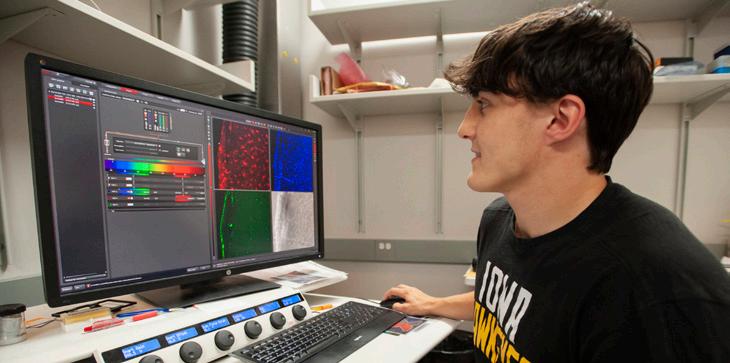 Andrew Forbes, Associate Professor
and
Maurine Neiman, Professor of Biology: $25,000 Diversity, Equity, and Inclusion (DEI) Supplement from the UI Office of the Vice President for Research (OVPR) for
parallel analysis
a snail-vectored
provides this award to principal investigators at the UI to advance their science while recruiting, retaining, and advancing UI students who support diversity, equity, and inclusion efforts in research.
Steven Green, Professor of Biology and Co-Investigator Ning Hu, Research Scientist
Green
Photo provided by Jill Tobin, CLAS Photographer
Andrew Forbes, Associate Professor
and
Maurine Neiman, Professor of Biology: $25,000 Diversity, Equity, and Inclusion (DEI) Supplement from the UI Office of the Vice President for Research (OVPR) for
parallel analysis
a snail-vectored
provides this award to principal investigators at the UI to advance their science while recruiting, retaining, and advancing UI students who support diversity, equity, and inclusion efforts in research.
Steven Green, Professor of Biology and Co-Investigator Ning Hu, Research Scientist
Green
Photo provided by Jill Tobin, CLAS Photographer
2022 Newsletter I 3
Undergraduate Scholarships and Awards
LINDA AND RICK MAXSON

Undergraduate Research Award
Established in 2020, the Linda and Rick Maxson Undergraduate Research Award supports undergraduate research in individual faculty labs in the Department of Biology. Over 35 undergraduates have benefited with hands-on research opportunities provided by the award. Bryan Guevara (Neiman Lab), a Biology major and recipient of the award says, “I’m incredibly grateful for the Maxsons’ support and generosity. It has given me the resources to do research on something I really care about.”
The Department of Biology is most grateful for Linda and Rick Maxson’s philanthropy. Their contributions over the past two years have greatly enhanced the undergraduate research experience in Biology. Dr. Linda Maxson served as Dean of the University of Iowa College of Liberal Arts and Sciences for 15 years, stepping down from that position on June 30, 2012, when she joined the Department of Biology faculty. She officially retired on June 30, 2018.
Biology Scholarships and Awards
Arthur
• Brianna Iverson (Weiner Lab)
Arthur
•
Avis Cone Undergraduate Research Fellowship
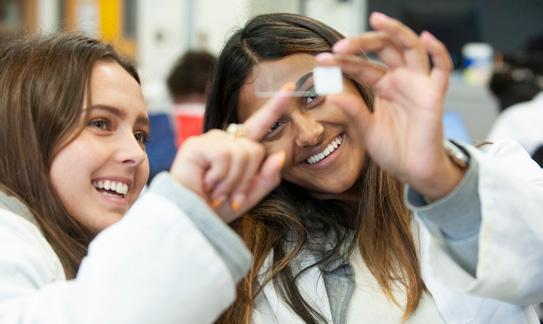


• Anika DeWald (Cheng Lab) –Summer 2022
*
otherwise indicated):
Clifford W. Hesseltine Award for Academic Excellence
• Jackson Dunning (Neiman Lab)
• Brianna Iverson (Weiner Lab)
Evelyn Hart Watson Undergraduate Research Fellowship
• Aasthika Das (Smolikove Lab) –Academic year 2022-2023
• Jacob Steffen (Malkova Lab) –Summer 2022
Lowden Prize for Outreach and Engagement in Biology
• Kartik Sivakumar*
 Bryan Guevara (Neiman Lab)
Linda and Rick Maxson
Bryan Guevara (Neiman Lab)
Linda and Rick Maxson
the generosity
our scholarship
Additional Scholarships and Awards Iowa Neuroscience Institute (INI) Summer 2022 Scholars Molly Harris (Neuroscience) Manuela Lizarazu (Neuroscience) Rochelle Lopez (Biology) 2022-23 Iowa Center for Research by Undergraduates’ (ICRU) Excellence in Undergraduate Research Award
Big Ten
Scholar
Women’s
As a result of
of
donors, the Department of Biology provided the following awards during the 2021–2022 academic year (unless
Daniel Fu (Biomedical Sciences) Lydia Guo (Biomedical Sciences) Pedro Marra (Biomedical Sciences) 2021-22
Conference Distinguished
Allyson Steffensmeier* (Biomedical Sciences),
Gymnastics *Maintained a 4.0 GPA 2022 Big Ten Medal of Honor Manuela Lizarazu (Neuroscience), Women’s Golf 2022 Goldwater Scholarship Rachael Volkman (Neuroscience)
J. and Flora D. Levin Award for Outstanding Undergraduate Research
J. and Flora D. Levin Excellence in Undergraduate Teaching Award
Caroline Crahan (nominated by Angela Cordle and David Rehard for a Teaching Internship in Biology –Human Biology for Spring 2022)
This scholarship is awarded through CLAS
4 I Department of Biology • biology.uiowa.edu
Photos provided by Jill Tobin, CLAS Photographer
SUMMER 2022
• Morgan Anderson (Neiman Lab)
• Dylan Dolezal (Eberl Lab)
• Nathan Freesmeier (Stipp Lab)
• Deven Strief (Dailey Lab)
• Jennavieve Zimmerman (Forbes Lab)
ACADEMIC YEAR 2022-2023
• Faith Bibeau (Neiman Lab)
• Dylan Dolezal (Eberl Lab)
• Anthony Mortale (Forbes Lab)
• Madeleine Ruzicka (Wu Lab)
Iowa Center for Research by Undergraduates (ICRU) Research Fellowship
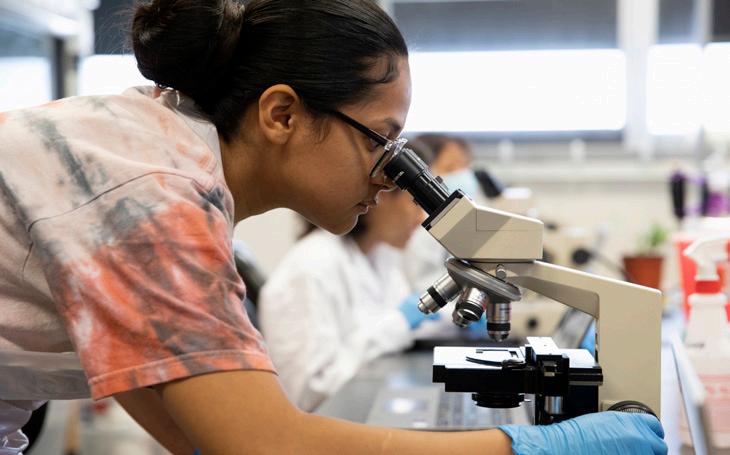
Listed to the left are students in the Department of Biology who received an ICRU (Iowa Center for Research by Undergraduates) Research Fellowship for the Summer 2022 or academic year 2022-2023. Department of Biology lab affiliations are listed in parentheses. This fellowship program allows current UI undergraduate students in any discipline to work with faculty or staff mentors on a specific research project during the summer and/or academic year. Funding is provided in the amount of $2,500 during the summer or $2,000 for the academic year.
Undergraduate Education
THE BEETLEMANIA GENOME SEQUENCING PROJECT
A major goal of developmental biology is to understand how mechanisms that control body patterning are co-opted during evolution to generate diverse external features. Undergraduates in the College of Liberal Arts and Sciences (CLAS) are getting an opportunity to tackle this outstanding question in an innovative way. Using cutting-edge technology purchased with Student Technology Fee (STF) funds, Biology undergraduates are collecting beetles and working together year-round on the “BeetleMania” genome sequencing project. Further support comes from the Department of Biology and an NSF-funded Research Experience for Undergraduates (REU) entitled “Engaging Undergraduates in Interdisciplinary Evolutionary Science” (Principal Investigators: Andrew Forbes, Associate Professor of Biology, and Maurine Neiman, Professor of Biology).
An STF award was granted to retool the experiential Evolutionary Laboratory course (BIOL:3676, course director, Albert Erives, Associate Professor of Biology) with “third generation,” single-molecule, long-read nanopore sequencing arrays. The course, which attracts undergraduates majoring in Biology or Environmental Sciences, is centered on a semester-long project that combines fieldwork, molecular biology and genome sequencing, and computational analyses of genomic data. Students begin the semester by going on field trips to various wooded sites throughout Johnson County to collect beetles in the wild and then observe them in the lab. Students identify their family, genus, and species and work in teams to select the most promising beetles to sequence, focusing on those that have uniquely patterned anatomies and for which sequenced genomes are not available.
Students next prepare genomic DNA and utilize Oxford Nanopore Technology’s MinION sequencing devices, which can plug directly into USB computer ports. These allow students to sequence thousands of long strands of individual DNA molecules simultaneously. In the last part of the course, students take the resulting sequence data and begin to assemble the genomes, piecing together DNA sequence in the computer to patch together intact chromosomes. Finally, students conduct phylogenetic analyses to understand and place each particular beetle species in an evolutionary framework to compare to known insect genomes.
A major goal of the Evolution Laboratory is for students to be able to publish new insights into beetle genomics as authors on publications. To that end, the first manuscript from the re-imagined course, featuring the genomes of five previouslyunsequenced beetle species, is being prepared for submission. Because genome assembly can be time-consuming, some undergraduates are continuing the project after the fall semester has ended. These Evolution Lab student “veterans” continue as research assistants in the Erives Lab under the NSF-funded REU program. Additional plans are also underway for students in other bioinformatics and genomics courses to participate by further analyzing the student-collected genomic data. The Beetlemania project is a great example of the ways CLAS support can be leveraged to provide cutting-edge scientific education for our undergraduates.
Written by Joshua Weiner, CLAS Associate Dean for Research, and Albert Erives,
Associate Professor of Biology
2022 Newsletter I 5
Photo provided by Jill Tobin, CLAS Photographer
Developmental Studies Hybridoma Bank
The Developmental Studies Hybridoma Bank (DSHB), a national resource by the National Institutes of Health (NIH) and housed in the Department of Biology, has been actively distributing hybridomas and monoclonal antibodies (mAbs) to companies and research institutions worldwide since 1986. The DSHB Collection is rapidly expanding to over 5000 monoclonal antibodies.
In 2021, the NeuroMab Collection of neuroscience and neurodevelopment antibodies (over 500 hybridomas) developed by James Trimmer at UC Davis was deposited with the DSHB. The NeuroMab Collection continues to grow at the DSHB with important new antibodies. The DSHB anticipates being able to distribute the full collection within the next year. The DSHB is also happy to announce the deposit of the antibodies against GRAP, VGlut2, and PSD-95. Over 85 NeuroMab antibodies have been produced and are immediately available. The DSHB would like to thank Dr. Trimmer and other depositors for sharing these reagents.

Professor Douglas Houston in the Department of Biology at the University of Iowa was named the director of the DSHB. Dr. Houston was serving as the interim director since last year. His blog post on the Node covers the history of the DSHB and their continuing mission to serve the scientific community.
https://thenode.biologists.com/featured-resource-developmental-studieshybridoma-bank/resources/
New staff at the DSHB in the last year includes Nicholas Chalkley, a Research Assistant; Nisha Jain, an Administrative Services Coordinator (Freight Processor); and Majd Moubarak as a part-time employee in the production lab.
Additional information can be found at dshb.biology.uiowa.edu.
Tara Hicks (Smolikove Lab): Tara studies meiosis and her work was published in the journal Nucleic Acids Research (Volume 50, Issue 14). Meiosis requires the formation of DNA damage in order for chromosomes to properly segregate into gametes and has a vast repair system meant to prevent erroneous genomic damage. We found that R-loops, a natural byproduct of transcription, create high levels of damage in the germline of the roundworm, C. elegans. Furthermore, this elevated damage remains unrepaired as it evades cellular damage checkpoints and apoptosis and manifests as chromosome fragments in the gametes, identifying R-loops as a threat to genomic integrity in meiosis.
Jerzy Twarowski (Malkova Lab): Mutations usually arise through DNA damage induced by a variety of environmental and intrinsic factors. One of the most severe types of damage is DNA Double-Stranded Breaks (DSBs) which must be repaired for the cell to survive. In our study, we described a new important source of mutagenic single-stranded DNA (ssDNA) formed during the DSB repair mechanisms called Break-Induced Replication (BIR)– the ssDNA template for BIR leading strand.
Specifically, we demonstrated that the bottom template strand (D-BTS) is susceptible to APOBEC3A (A3A)-induced DNA lesions leading to mutations associated with BIR. Also,
we demonstrated that BIR-associated ssDNA promotes an additional type of genetic instability– replication slippage between microhomologies stimulated by inverted DNA repeats. Based on our results, we propose that these events are stimulated by both known sources of ssDNA formed during BIR, nascent DNA formed by leading strand synthesis, and the D-BTS that we described here. Together, we report a new source of mutagenesis during BIR that may also be shared by other homologous recombination pathways driven by BIR-like synthesis.
This work was published in the journal Nucleic Acids Research (Volume 50, Issue 12) with Jerzy and former iBio graduate student, Beth Osia, as joint first authors under the guidance of Anna Malkova, Roy J. Carver Professor of Biology.
Christopher Youngstrom (Cheng Lab): Plants have the lifelong ability to generate new organs due to the persistent functioning of stem cells. As such, continuous stem cell divisions are highly regulated. However, outside of flowering plants little is known about how stem cells are maintained. Therefore, we investigated the role the WUSCHEL-RELATED HOMEOBOX (WOX) transcription factors in lycophytes, ferns, and flowering plants and asked how WOX genes maintain stem cells between related species of land plants. We found that a related WOX gene between lycophytes, ferns, and seed plants likely had ancestral function in maintaining stem cells of vascular tissues before being recruited to stem cells of the shoot and root. We propose an updated trajectory of WOX gene evolution in land plants. Christopher’s work was published in the journal BMC Plant Biology
Featured below are selected publications with Integrated Biology (iBio) graduate students as first author.
Updates 6 I Department of Biology • biology.uiowa.edu
DIVERSITY UPDATE
Department of Biology Receives Diversity Award
The Department of Biology received a 2021 Diversity Catalyst Seed Grant in the amount of $1,000 from the Division of Diversity, Equity, and Inclusion (DEI) at the University of Iowa. The award helped establish a “Little Free DEI Library” in the Department of Biology for faculty, staff, and students to checkout general and discipline-specific books focused on issues related to DEI.


The Diversity Catalyst Seed Grant supports new initiatives contributing to DEI-related strategic goals either at the departmental, college, or university level.
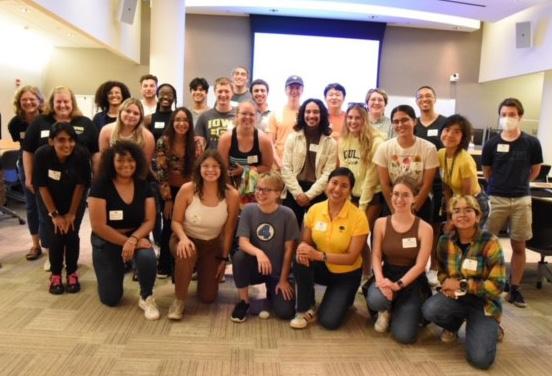
Biology Professor Leads Campus Diversity Initiative


The University of Iowa (UI) has become a charter member of the American Association for the Advancement of Science (AAAS) STEMM Equity Achievement (SEA) Change program. “The mission of AAAS SEA Change is to inspire, guide, and support the voluntary transformation of diversity, equity, and inclusion (DEI) in STEMM (science, technology, engineering, math, medicine) fields.” The “change team” at the UI will produce a comprehensive inventory of all DEI activities and content initiatives and will review policies, procedures, and programs. The team will also evaluate Campus Climate Survey results to better understand Iowa’s DEI challenges and opportunities. The team will then develop a plan to build a more inclusive university community. Maurine Neiman, Professor in the Department of Biology and UI DEI Faculty Fellow, will help lead this effort with the Office of the Provost. Lori Adams, Associate Professor of Instruction in the Department of Biology and Director of the Iowa Sciences Academy is a member of the “change team.”
The University of Iowa prohibits discrimination in employment, educational programs, and activities on the basis of race, creed, color, religion, national origin, age, sex, pregnancy (including childbirth and related conditions), disability, genetic information, status as a U.S. veteran, service in the U.S. military, sexual orientation, gender identity, or associational preferences. The university also affirms its commitment to providing equal opportunities and equal access to university facilities. For additional information on nondiscrimination policies, contact the Director, Office of Institutional Equity, the University of Iowa, 202 Jessup Hall, Iowa City, IA 52242-1316, 319-335-0705, oie-ui@uiowa.edu.
Iowa Sciences Academy
The Iowa Sciences Academy (ISA), formerly known as the Iowa Biosciences Academy (IBA), now serves as an umbrella for a range of programs that support the success of qualified University of Iowa undergraduate students interested in scientific research and communication. The modified name change from IBA to ISA better reflects the variety of programs that serve to support student success in the biosciences and beyond. ISA is administratively housed in the Department of Biology and is directed by Lori Adams, Associate Professor of Instruction in Biology and Director of Science Engagement with the College of Liberal Arts and Sciences (CLAS).
Through ISA programs and affiliated courses, students have access to hands-on research, mentoring, professional development, and scientific outreach opportunities. The programs affiliated with ISA hold diversity and inclusion as core values and provide support to students from their first year through their senior year. Adams states, “ISA recognizes the critical role of faculty, post-doctoral researchers, graduate students, and staff in the development of students as scientists.” To that end, Adams offers research mentor training three times a year and leads mentoring seminars throughout the year. For more information about ISA, visit isa.uiowa.edu
To support the ISA programs, CLAS awarded two new half-time Graduate Assistantships in 2022 to Briante Najev and Kelley Withers, both Ph.D. candidates in the Integrated Biology (iBio) Graduate Program. The faculty and staff affiliated with ISA would also like to thank Brinda Shetty, Associate Director, for her many years of outstanding service to current and former students. Brinda transitioned to a new position on campus and had been with ISA/IBA since 2013. Her ideas and contributions were instrumental in helping to establish and develop several of the programs in existence today.
Iowa Sciences Academy
Maurine Neiman
2022 Newsletter I 7
Lori Adams
Graduate Scholarships and Awards
Michael J. Dykstra Graduate Scholarship Fund
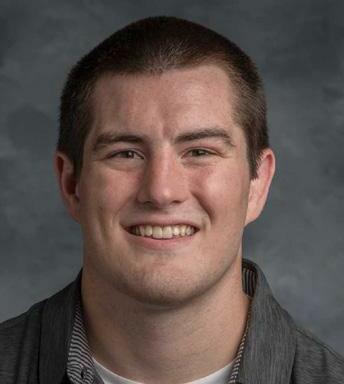
The Michael J. Dykstra Graduate Scholarship Fund provides scholarship support for a graduate student in the Integrated Biology (iBio) Graduate Program. Adrianna Caro (Green Lab) was the recipient of this award for summer 2022. Adrianna is a Ph.D. student in the lab of Steven Green, studying the role of the immune response in the death of auditory neurons. The Dykstra Graduate Scholarship gave Adrianna the opportunity to focus on developing a new experimental protocol using flow cytometry to characterize the types of immune cells that are present in the cochlea after injury to inner ear hair cells. Additionally, Adrianna is passionate about mentoring fellow graduate and undergraduate student researchers in the lab.


Dykstra, who earned both his B.A. (1969) and M.S. (1971) in Botany at the University of Iowa, believes strongly in higher education and hopes that his gift will provide educational support for future leaders in scientific research and teaching.
Avis E. Cone Fund/Excellence in Botany
The Avis E. Cone Fund/Excellence in Botany is intended for students in botany, zoology, or conservation. Christopher Youngstrom (Cheng Lab) was the recipient of this award for summer 2022. Christopher’s research as a Ph.D. student involved studying the evolution of stem-cell regulation across land plants. The Avis Cone Fund provided Christopher significant support to focus on research related to his thesis and his dissertation writing and defense. Christopher graduated in summer 2022 with his Ph.D. in Integrated Biology.
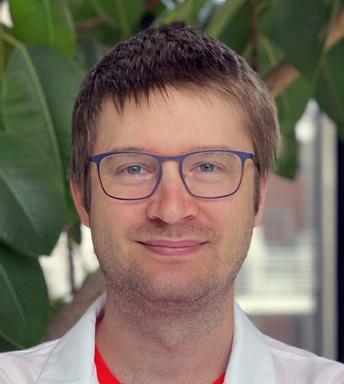
Carol B. and Robert G. Lynch Department of Biology Graduate Fund
The Carol B. and Robert G. Lynch Department of Biology Graduate Fund is intended to support graduate students as they receive a combination of didactic training, research exposure, and tailored mentoring. The fund will also support career development in the form of graduate student travel to scientific meetings as well as publication costs. Rosemary Lee (Malkova Lab), Krishna Nukala (Manak Lab), Ryan Pellow (Comeron Lab), and Hui (Thea) Tian (Smolikove Lab) – all Integrated Biology (iBio) Ph.D. students – were the recipients of this award for summer 2022.

During summer 2022, Rosemary visited Baylor College of Medicine in Houston to perform ChIP experiment to measure the enrichment of Pif1 DNA helicase during Break-Induced Replication and this work will be published in the journal PLOS Genetics Krishna works on uncovering novel pathways of epilepsy using fruit flies. He used this award to continue experiments to uncover the contribution of oxidative stress to epilepsy. Using a combination of genetic and pharmacological approaches, he has shown that antioxidants can significantly suppress seizures in a fruit fly model of human epilepsy, paving the way to the development of novel anti-seizure medications. Ryan’s research focuses on decoding the key properties of genomes in 3D space within nuclei and used the Lynch Graduate Fund to prepare next-generation sequencing (NGS) libraries, which allowed him to find that de novo transposable elements insert at random genomic locations, impact looping dynamics, and alter transcription. In the Smolikove Lab, Thea was involved in a project that identified the precise time window in which DNA double strand breaks (DSBs) are targeted for crossovers (the exchange of DNA between chromosomes) and are formed in the germline (the tissue that generates egg and sperm). Thea’s results indicated that crossovers are likely to be formed in a narrower time window than previously speculated. This allowed the revision of the current model for crossover formation indicating that the timing of DSBs affect the repair outcome and was part of the work published in the journal Cell Reports (September 27, 2022 issue).
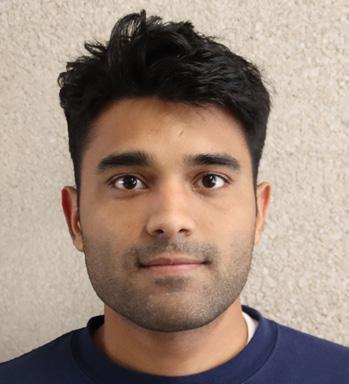
The Lynch’s received their Ph.D. degrees in Zoology from the University of Iowa – the late Carol in 1971 and Robert (Bob) in 1972. Their bequest to the Integrated Biology (iBio) Graduate Program is in honor of their advisers, Hugh Dingle and Joe Hegmann.
 Adrianna Caro
Christopher Youngstrom
Rosemary Lee Krishna Nukala
Adrianna Caro
Christopher Youngstrom
Rosemary Lee Krishna Nukala
8 I Department of Biology • biology.uiowa.edu
Ryan Pellow Hui (Thea) Tian
The Department of Biology Summer 2022 Graduate Fellowships, which are supported by donations to the department for graduate students, allowed Integrated Biology (iBio) Ph.D. students Emily Hirsch (Phillips Lab) and Shulin Liu (Fassler Lab) to perform their thesis research during the summer. The department is very appreciative of the generosity of our scholarship donors for these awards.
Graduate College Ballard and Seashore Dissertation Fellowship
Krishna Nukala (Manak Lab) – Fall 2022
David Steffen (Weiner Lab) – Spring 2022
Graduate College Summer Fellowship (Summer 2022)
Jinye Liang (He Lab)

Maria F. Valdes Michel* (Phillips Lab)
Emma Thornburg-Suresh** (Summers Lab)

Kelley Withers (Cheng Lab)
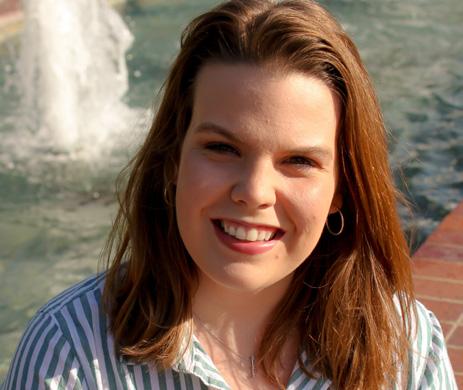

* Interdisciplinary Graduate Program in Genetics PhD student
* * Interdisciplinary Graduate Program in Neuroscience PhD student
Graduate College Post-Comprehensive Research Fellowship
Tara Hicks (Smolikove Lab) - Spring 2022
Graduate College Lulu Merle Johnson Recruitment Fellowship
Guerin Brown (Forbes Lab)
Athena Kvamme* (Cheng Lab)
* Interdisciplinary Graduate Program in Genetics PhD student
College of Dentistry Oral Health Training Fellowship
Sydney Arlis (Manak Lab) – Fall 2021 through Summer 2022
UI
Chelsea Higgins (Neiman Lab) – Fall 2022
Graduate College Iowa Recruitment Fellowship
Briante Najev (Neiman Lab) – Summer 2022



Briante Najev (iBio Ph.D. student, Neiman Lab)
Received a Graduate Student Research Travel Grant (UI Center for Global & Regional Environmental Research) and a 2022 T. Anne Cleary International Dissertation Research Fellowship to help fund her trip to study freshwater snails in New Zealand (December 2022).

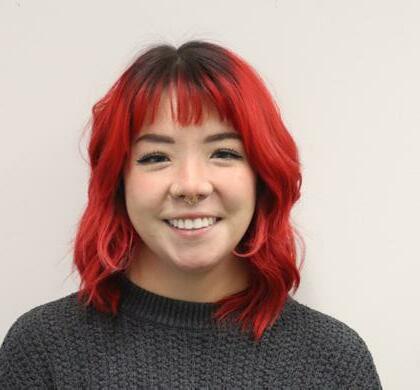


Awarded the Melbourne R. Carriker Student Research Award in Malacology to cover flow cytometry expenses for an experiment.
Received travel grants to attend the Evolutionary Biology Graduate Student Workshop at the Mountain Lake Biological Station in Pembroke, Virginia (June 2022) and the Evolution 2022 Conference in Cleveland (June 2022).
UI Environmental Health Sciences Research Center Grant
Ryan Pellow* (Comeron Lab) - Fall 2022
* Funded by the UI College of Public Health Gordon Research Conference
Ryan Pellow, an Integrated Biology Ph.D. student in the Comeron Lab, was invited to attend and present his novel method to characterize 3-dimensional genomes at the 2022 Gordon Research Conference on Chromatin Structure and Function held in Spain from May 29–June 3, 2022.

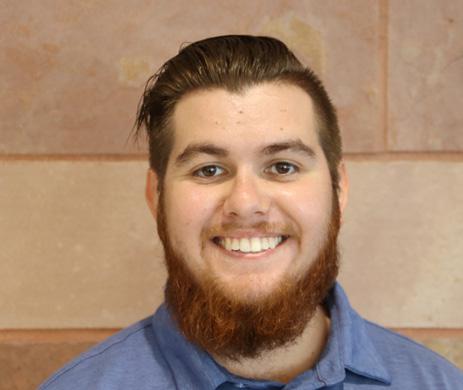 Emily Hirsch Shulin Liu
David Steffen
Guerin
Brown
Maria F. Valdes Michel
Kelley Withers
Sydney Arlis
Briante Najev
Jinye Liang
Emma ThornburgSuresh
Tara Hicks
Athena Kvamme
Chelsea Higgins
Office of the Vice President for Research DEI Supplement Award
Emily Hirsch Shulin Liu
David Steffen
Guerin
Brown
Maria F. Valdes Michel
Kelley Withers
Sydney Arlis
Briante Najev
Jinye Liang
Emma ThornburgSuresh
Tara Hicks
Athena Kvamme
Chelsea Higgins
Office of the Vice President for Research DEI Supplement Award
2022 Newsletter I 9
PH.D. GRADUATE STUDENTS
Parisa Foroozandeh (Prahlad Lab)


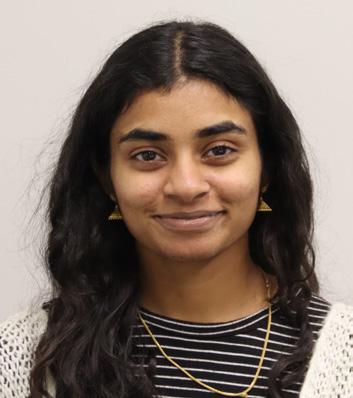
Joseph Jalinsky (Neiman Lab)






Liping Liu (Malkova Lab)

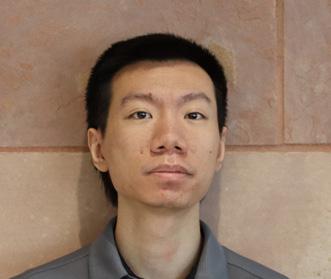

Nikale Pettie (Comeron Lab)







Christopher Youngstrom (He Lab)

Faculty Update
Former Biology professor and Departmental Executive Officer, Diane Slusarski, was named the Associate Provost and Dean of the Graduate School at Rochester Institute of Technology (RIT) in Rochester, New York, effective August 1, 2022. Dr. Slusarski spent more than two decades in the Department of Biology including five years as the first female chair in the department’s history. We wish Dr. Slusarski the best of luck in her new role at RIT and thank her for her many years of service to the department.



Faculty and Staff Updates
NEW FACULTY AND STAFF
Christine Kondratick CCG Manager
Krista Osadchuk Visiting Assistant Professor for Human Biology courses
Pamela Wilhoite Neuroscience Undergraduate Advisor
Julia Hetherton Research Assistant (Green Lab)
Varshu Saravanakumar Research Assistant (He Lab)
Emily O’Brien Research Assistant (He Lab)
The
the following
the
and postdoctoral
i
1.
2.
3.
4.
5.
6.
iBIO MASTER’S GRADUATE STUDENTS 7.
8.
9.
1.
2.
3.
4.
5.
6.
NEW GRADUATE STUDENTS AND POSTDOCS 5 6 7 3 8 4 9 1 2 4 5 6 3 1 2 10 I Department of Biology • biology.uiowa.edu
Diane Slusarski
Department of Biology welcomed
graduate students into
Integrated Biology (iBio) Graduate Program
research scholars in 2022.
BIO
Eric Anderson (Stipp Lab)
Guerin Brown (Forbes Lab)
Chase Lathrum (Summers Lab)
Kelsi Mann (Houston Lab)
Alexys McGuire (Summers Lab)
Christian Weinrich (Forbes Lab)
Merve Addemir (Summers Lab)
Hanxi Tang (He Lab)
Zhenshen Zhang (Green Lab) POSTDOCTORAL RESEARCH SCHOLARS
Andrew Deonarine (Prahlad Lab)
RETIREMENTS
Richardson - Engineering Coordinator
Jeremy Richardson, Engineering Coordinator for the Department of Biology, retired on March 1, 2022.

Jeremy started working in Biology in 1990 as an Honors student building things in the laboratory of Professor Alan Kay. While working in Dr. Kay’s lab and being a full-time student majoring in Biology, he managed to find time working at the University of Iowa Hospitals and Clinics (UIHC) as a phlebotomist. He fell in love with pediatric phlebotomy and later became head of that unit at UIHC. In 1996, he was hired as a full-time employee in Biology. People in the department and across campus would contact Jeremy to build and repair equipment/devices and
come up with solutions to nearly anything they needed help with including working with students’ projects in their classes. Jeremy often used a laser machine in the Biology Engineering Shop for projects, which was popular for engraving graphics on items. He was also involved in building architectural models including Petersen Residence Hall and the Chauncey building in downtown Iowa City to name a few.
Jeremy says he “worked with a ton of wonderful people” including his colleague in the Department of Biology, Hanh Kratz. “She was creative, brilliant, and fun to work with.”
Jeremy said the favorite part of his job was being creative and even though he’s retired from the UI, he’s still keeping busy. His love for creativity and the theater has led him to working for Riverside Theatre in Iowa City where he builds sets for shows. In his spare time, Jeremy likes to travel and spend time with his three girls.
After 20 years with the University of Iowa, Bryant McAllister retired at the end of the Fall 2022 semester. Born in Greenville, Texas, Dr. McAllister grew up an avid outdoorsman. With his interests more in animals than plants, he pursued his B.S. in Zoology from Texas A&M University. With one year left in his undergraduate studies, he was asked to join a master’s program by his undergraduate research advisor, Ira Greenbaum, leading him to pursue his Master’s in Genetics from his alma mater. This experience opened his eyes to the world of academia, which led him to receive his Ph.D. in Biology from the University of Rochester. After being awarded the prestigious NSF Sloan grant for postdoctoral work, Dr. McAllister studied with Dr. Brian Charlesworth, splitting time between the University of Chicago and the University of Edinburgh in Scotland. During this time, he began working on sex chromosome evolution in Drosophila americana. He spent the next 25 years of his career exploring, discovering, and publishing work on the clinal distribution of sex-linkage in Drosophila americana His work is highlighted in over 30 published research articles. Dr. McAllister came to the University of Iowa Department of Biology in 2002, where he was hired as an Assistant Professor and later became an Associate Professor. During his time at Iowa, he has made significant contributions to
the Biology undergraduate program. In 2010, he designed and initiated the Evolution Lab course. From 2012-2016, he held the role of the department’s Associate Chair for Undergraduate Studies. Among his accomplishments during this time was playing a key role in the review and redesign of the introductory biology course sequence including the redevelopment of Foundations of Biology. Dr. McAllister also developed and has served as Director of the Biomedical Sciences program, an interdisciplinary major designed for students who plan to attend medical school or conduct biomedical research in graduate school and beyond. Most recently in 2020, Dr. McAllister redeveloped the course Genes, Genomes & The Human Condition.
Dr. McAllister is well-known in the community and beyond for his interest and expertise in genealogy. In 2015, he established the Personal Genome Learning Center where he engaged students in the direct-to-consumer genetic marketplace in preparation for outreach efforts in the community including a monthly DNA Interest Group meeting at the Iowa City Public Library and an annual event to celebrate National DNA Day. Dr. McAllister’s professional memberships include the American Association for the Advancement of Science and the Genetics Society of America to name a few.

In retirement, Dr. McAllister plans to spend time with his wife, Terry, developing their farm in Missouri.
Written by Caleb McCabe, Biomedical Sciences student, for a project in the Latham Science Engagement Fellowship Program.
Jeremy
Bryant McAllister - Associate Professor
Bryant McAllister
2022 Newsletter I 11
Jeremy Richardson
Faculty and Staff Awards
Daniel Eberl, Professor of Biology and Director of the Interdisciplinary Graduate Program in Genetics, will conduct research on the genetics, physiology, and mechanics of mosquito hearing at Nagoya University in Japan from September 1, 2022–June 30, 2023. In addition to the University of Iowa, Dr. Eberl will be supported by the International Principal Investigator Invitation Program at Nagoya University, the Nagoya University Neuroscience Institute, and a fellowship from the Japan Society for the Promotion of Science.

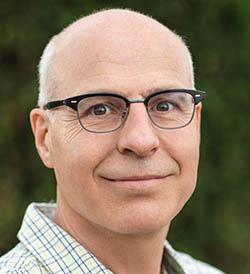
Bernd Fritzsch, Professor Emeritus, gave a presentation entitled “Neurons and Hair Cells Require Lmx1a/b for Normal Brainstem Development” at the Molecular Biology of Hearing and Deafness Conference held in Iowa City on May 24–27, 2022. Dr. Fritzsch also presented, “Making a brainstem and a cochlea require Lmx1a/b,” at the 10th European Conference on Comparative Neurobiology held in Prague, Czech Republic, on June 22–24, 2022.
Anna Gaw, Senior Academic Advisor in the Department of Biology, is a member of the Communications Committee within the College of Liberal Arts and Sciences’ Advising Network that received an I.O.W.A. (Improving Our Workplace Award) in spring 2022. The committee developed weekly communications for advisors to share with their students. The I.O.W.A. affords supervisors and co-workers the opportunity to recognize staff for initiative and innovation that have had positive results in their workplace.
Ana Llopart, Associate Professor of Biology, co-chaired two Evolution platform sessions at the 63rd Annual Drosophila Research Conference held in San Diego, California, on April 6–10, 2022.
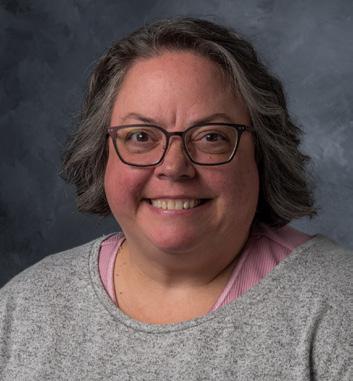
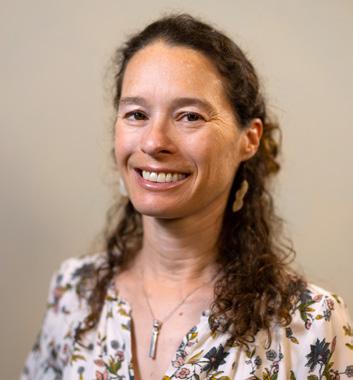
YEARS OF SERVICE
Maurine Neiman, Professor of Biology, gave a keynote lecture on “Sex in the Wild (and especially in New Zealand)” at the Iberian Ecological Society (SIBECOL) Meeting held in Aveiro, Portugal, on July 3–8, 2022.

Veena Prahlad, Associate Professor of Biology, was a conference organizer for the “Metabolism, Aging, Pathogenesis, and Stress in C. elegans” meeting held on the campus at the University of Wisconsin-Madison on July 14–17, 2022.

Deborah Wessels, a former Associate Research Scientist in the Soll Lab in the Department of Biology, received the 2022 Susan C. Buckley Distinguished Achievement Award for Staff. The award honors staff who have made outstanding contributions to their fields and serve as role models and mentors for women and/or girls. Dr. Wessels made several notable discoveries on cell motility in cancers and other diseases and helped develop state-of-the-art analyses for live video microscopy. She retired in January 2022 after working in the Soll Lab for 36 years.
Biology Faculty & Staff at the University of Iowa
•
•
•
•
•
Ana Llopart
Daniel Eberl
Maurine Neiman
Bernd Fritzsch
Veena Prahlad
10 YEARS
Angela Cordle – Instructional Services Specialist
Anna Gaw
•
Albert Erives – Associate Professor
Ning Hu (Green Lab) – Research Scientist
Yang-Nim Park (DSHB) – Associate Research Scientist
Veena Prahlad – Associate Professor 15 YEARS • Susan Dean – Assistant in Instruction 20 YEARS
Amy Clemons (Phillips Lab)–Research Assistant
Josep Comeron – Professor
Bryant McAllister – Associate Professor
•
•
•
Kristine Williams – Assistant in Instruction 25 YEARS
35 YEARS
• Atsushi Ueda (Wu Lab)– Assistant Research Scientist
–
• Jan Fassler
Professor
• Steven Green – Professor
12 I Department of Biology • biology.uiowa.edu
CONGRATULATIONS 2021-22 GRADUATES!
Spring 2022 Undergraduate Honors Students

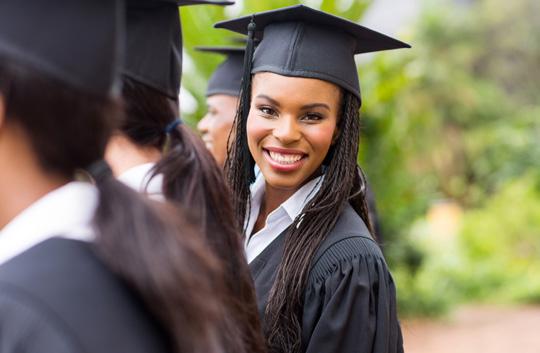
Listed to the right are undergraduate students who graduated with honors in the major. Students who graduate with honors must fulfill the regular requirements for a Bachelor of Arts (BA) or Bachelor of Science (BS) degree and maintain a grade point average of at least 3.33 (overall and in the major). Students must also conduct research in the laboratory of a faculty member, write an honors thesis, and give a brief oral presentation of their research findings among other requirements.


• Rishika Avvari (Dunnwald Lab), B.S. in Biomedical Sciences
• Abigail Davison (Russo Lab), B.S. in Neuroscience
• Jackson Dunning (Neiman Lab), B.S. in Biology
• Gabriel Gaudencio (LaLumiere Lab), B.S. in Neuroscience
• Suzanne Mason (Marcinkiewcz Lab), B.S. in Neuroscience
• Alexis Oppman (Grueter Lab), B.S. in Biomedical Sciences
• Madison Sieperda (Van Otterloo Lab), B.S. in Biomedical Sciences
• Dane Tow (Ear Lab), B.S. in Biomedical Sciences
Integrated Biology (iBio) Graduate Program
MASTER OF SCIENCE (M.S.)
• Sarah DeLong-Duhon (Forbes Lab), Spring 2022
Thesis: “Rediscovering a common mushroom with molecular techniques: Elucidating Stereum taxonomy and evolutionary history”
• José Di Paola (Neiman Lab), Fall 2021
Thesis: “Patterns of Conservation and Diversity Amongst Tandemly Repeated Multigene Families Across Mollusks”
• Brad Orpano (Cheng Lab), Fall 2021 Non-thesis
• Elif Sermet (Prahlad Lab), Fall 2021 Non-thesis
• Jenifer Valdez (Smith and Eberl Labs), Spring 2022
Thesis: “A Rare C3 Glomerulopathy Familial Case: Insights and Models”
Interdisciplinary Ph.D. Graduate Program
• Kimberly Bekas (Phillips Lab), Genetics Program, Spring 2022
Thesis: “The role of Groucho proteins and repression in Wnt polarized asymmetric cell division in C. elegans”
DOCTOR OF PHILOSOPHY (PH.D.)
• Tirthasree Das (Slusarski Lab), Fall 2021
Thesis: “Characterization of Ubiquitin Dynamics in Mice Photoreceptors”
• Benjamin Gansemer (Green Lab), Fall 2021
Thesis: “Death of a Spiral Ganglion Neuron: From Synapses to the Immune System”
• Krista Osadchuk (Irish Lab), Fall 2021
Thesis: “Vegetative Phase Change Timing in Maize Integrates Several Leaf-Derived Signals and Molecular Processes”
• Sydney Skuodas (Fassler Lab), Summer 2022
Thesis: “The ABCF Gene Family Facilitates Aggregate Processing”
• David Steffen (Weiner Lab), Summer 2022
Thesis: “Similar but Unique: Shared and Distinct Roles for Individual Members of the GammaProtocadherin Family”
• Anna Ward (Forbes Lab), Spring 2022
Thesis: “Diversity and the evolution of host ranges in the North American oak gall wasps and their associated inquilines and parasitoids”
• Christopher Youngstrom (Cheng Lab), Summer 2022
Thesis: “New Insights on WOX Gene Evolution in Land Plant Development from Characterizing Their Expression and Functions in the Fern Ceratopteris richardii”
Graduates
2022 Newsletter I 13
Photos provided by Jill Tobin, CLAS Photographer
Benjamin Gansemer, an alumnus of the Integrated Biology (iBio) Graduate Program, received the “Best Trainee Presentation Award” for his talk at the Molecular Biology of Hearing and Deafness Conference held in Iowa City on May 24–27, 2022. The title of his talk was “Neurodegeneration in the Cochlea After Hair Cell Loss is Due to an Immune Response.” Dr. Gansemer received his Ph.D. in Integrated Biology in 2021 under the direction of Biology professor, Steven Green.
Clark Stanford (B.S. in Zoology, 1984), was named Dean of the University of Iowa College of Dentistry and Dental Clinics effective April 1, 2022.
Former Biology Ph.D. Student Receives Prestigious Award
Beth Osia, an alumna of the Integrated Biology (iBio) Graduate Program, was selected as the recipient of the Rex Montgomery Dissertation Prize in 2022 from the Graduate College at the University of Iowa for her dissertation entitled, “Sources and Signatures of Mutagenesis in Break-Induced Replication.” The Rex Montgomery Dissertation Prize recognizes the most meritorious dissertation by a doctoral student conducting research in prevention of disease and/or the translation of research into clinical practice. This is the first time that a Biology graduate student has received the Rex Montgomery Dissertation Prize. Dr. Osia completed her Ph.D. in Integrated Biology in 2020 under the direction of Anna Malkova, Roy J. Carver Professor of Biology. She is currently a Postdoctoral Research Fellow at City of Hope.
IN REMEMBRANCE
Listed below is the most recent update of the names of Department of Biology alumni and friends who have passed away. Birth name or nickname (if applicable) and deceased date are listed in parentheses.
Source: University of Iowa Center for Advancement and UI Alumni Records
• Alt, Deborah S. – B.A. Zoology, 1977 (June 5, 2022)
• Amsbury, Stanley A. – B.A. Botany, 1960 (December 31, 2021)
• Andreasen, Alan M. – B.S. Biology, 1991 (October 3, 2022)
• Banwell, Robert G. – B.A. Zoology, 1957 (May 8, 2021)
• Beaudoin, Allan R. – Ph.D. Zoology, 1954 (June 10, 2022)
• Bieri, Sheldon J. – B.S. Zoology, 1978 (April 24, 2022)
• Divelbiss, James E. – M.S. Zoology, 1959; Ph.D. Zoology, 1961 (June 17, 2022)
• Donovan, William C. – B.A. Zoology, 1950 (January 4, 2021)
• Erickson (Nielsen), Nancy – B.A. Zoology, 1957 (February 7, 2022)
• Flodin, John R. – B.A. Zoology, 1947 (December 23, 2017)
• Freed, Leonard A. – Ph.D. Zoology, 1981 (October 24, 2021)
• Hansen, Margaret J. – B.S. Zoology, 1983 (January 3, 2022)
• Hayek, John M. W. – M.S. Botany, 1956 (October 24, 2021)
• Herman, Robert J. – B.S. Biology, 1992 (July 22, 2021)
• Jacobson (James), Jacqueline –M.S. Botany, 1952 (Deceased date unknown)
• Kemper (Aita), Doris – B.A. Zoology, 1943 (August 11, 2021)
• King, Gregory J. – B.S. Biology, 1994 (January 6, 2021)
• Miller, Robert M. – M.S. Botany, 1966; Ph.D. Botany, 1975 (August 8, 2021)
• Mintz, Beatrice – M.S. Zoology, 1944; Ph.D. Zoology, 1946 (January 3, 2022)
• Moeller, Gregory E. – B.A. Biology, 1994 (February 25, 2022)
• Oostenink, William J. – M.S. Botany, 1960; Ph.D. Botany, 1965 (September 6, 2020)
• Othmer, Richard E. – B.A. Zoology, 1951 (February 15, 2021)
• Park, Roger L. – B.S. Botany, 1967 (January 3, 2019)
• Pomerantz (Brown), Judith A. –B.A. Zoology, 1967 (June 9, 2021)
• Robinson, Marcia Lee – B.A. Zoology, 1943 (April 5, 2021)
• Simpson (Muchmore), Jane M. – M.S. Botany, 1969 (February 1, 2022)
• Urs (Ramaraje), N. V. (Veeraraj) –M.S. Botany, 1968 (May 9, 2019)
• Youngquist, H. Warren – B.S. Zoology, 1966 (July 6, 2022)
Alumni Updates 14 I Department of Biology • biology.uiowa.edu
FEATURED ALUMNI
2020.
The project, titled “Genomic, cellular, and physiological effects of whole-genome duplications on organismal energy production” aims to study how plants adjust cellular energy production to compensate for a history of genome duplication. The project will provide opportunities for NMT undergraduate and graduate students to participate in laboratory research, and students from two high schools will experience DNA sequencing first-hand.
SEND US YOUR NEWS!
Email biology@uiowa.edu or complete the “Keep-In-Touch” form on our website at https://biology.uiowa.edu/alumni
Featured below are two Biology undergraduate alumni who are successful in their careers at Integrated DNA Technologies (IDT), the largest manufacturer of custom oligo products in the world.
Nick Eginoire began his career at IDT working part-time as a Production Technician in the Quality Control department while going to school full-time at the University of Iowa as a Biology student. Shortly after graduating in the spring of 2017 with a Bachelor of Arts degree in Biology, Nick transitioned to a Quality Control development role working primarily on Next Generation Sequencing. In late 2018, after Danaher Corporation acquired IDT, Nick became a Danaher Business Systems Leader and was later promoted to his current job as Manager of Planning where he oversees part of the supply chain for IDT, a position he has held since January 2021. Nick says his degree in Biology has given him the skillset to apply what he’s learned throughout his professional career. As a student at Iowa, Nick worked in the Malkova Lab in the Department of Biology as an undergraduate researcher. He credits the faculty in Biology for always being helpful and enjoyed working with the graduate students in the lab. He was also involved as a Biology student ambassador and enjoyed meeting with prospective students, giving department tours, and participating in student panels. His advice for students today is to take calculated risks. “Don’t be afraid of the illusion of failure,” says Nick. “Work hard. Don’t be afraid to put in the extra mile.” Nick is currently pursuing an MBA at the University of Iowa.


When Talitha Ford came to the University of Iowa (UI) in the fall of 2015, she liked science and writing but wasn’t sure what to do with those interests. “I loved the diversity of opportunities (at the UI),” says Talitha. “(The UI) is a really cool place to just learn about the world and try new things.” While at Iowa, she worked in the Smolikove Lab, which Talitha says provided her the opportunity to do hands-on science. “It was really exciting (working in Dr. Smolikove’s Lab). It really opened up all sorts of opportunities and ways to think about careers. She (Dr. Smolikove) was absolutely fantastic. I use everything she taught me.” Talitha also volunteered as a student ambassador for the Department of Biology.
After completing her Bachelor of Science degree in Cell and Developmental Biology and a Certificate in Writing in the spring of 2019, Talitha took a position at nearby IDT in Coralville, Iowa, where she started as a Technician II in the Sequencing Analytic Group within the Custom Quality department. After about a year in that role, she transitioned to the Functional Testing Group (FTG) as a Technician II. In June of 2021, Talitha was promoted to her current position as a Custom Quality Control Specialist in FTG where she spends about half of her time in the lab and half outside the lab. Talitha says it’s a well-balanced job where she gets to do a little bit of everything utilizing her science and writing skills. “My Biology degree specifically is very relevant to what I do. All of the concepts I learned in the classroom I have to apply everyday. Biology definitely plays a role in my job.”
 Joel Sharbrough
Nick Eginoire Talitha Ford
Joel Sharbrough, a former Biology graduate student, received a five-year, $1.2 million CAREER Award in 2022 from the National Science Foundation to lead a cutting-edge plant genomics research project. Dr. Sharbrough received his Ph.D. in Integrated Biology from the University of Iowa in 2016 under the direction of Maurine Neiman, Professor of Biology. He has been an Assistant Professor in the Department of Biology at the New Mexico Institute of Mining and Technology (NMT) since
Joel Sharbrough
Nick Eginoire Talitha Ford
Joel Sharbrough, a former Biology graduate student, received a five-year, $1.2 million CAREER Award in 2022 from the National Science Foundation to lead a cutting-edge plant genomics research project. Dr. Sharbrough received his Ph.D. in Integrated Biology from the University of Iowa in 2016 under the direction of Maurine Neiman, Professor of Biology. He has been an Assistant Professor in the Department of Biology at the New Mexico Institute of Mining and Technology (NMT) since
2022 Newsletter I 15
Dr. Sharbrough teaches genetics and evolution and leads two Course-based Undergraduate Research Experiences (CURE) in bioinformatics and functional genomics at NMT. Content provided by Katie Bauer, Communication Specialist, NMT.
Private funding is critical for our department’s continued success as we seek to support student research, invest in state-of-the-art equipment, fund seminar series and lectureships, and attract and retain outstanding faculty members. To learn how monetary gifts can make a difference, please visit www.givetoiowa.org/biology or contact Jessica Mattes at the UI Center for Advancement at Jessica.Mattes@foriowa.org or 319-467-3533 We appreciate your support!






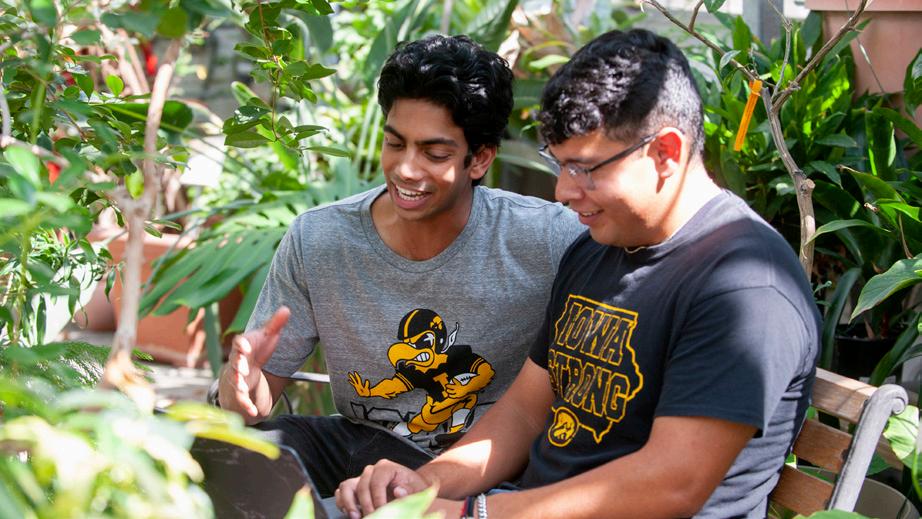

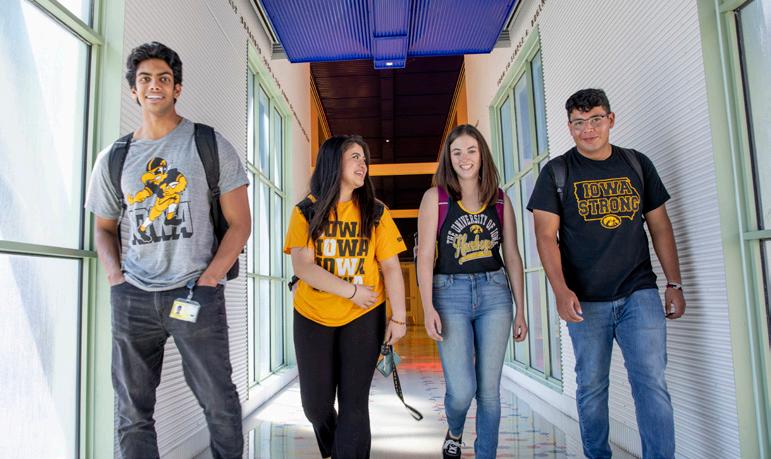
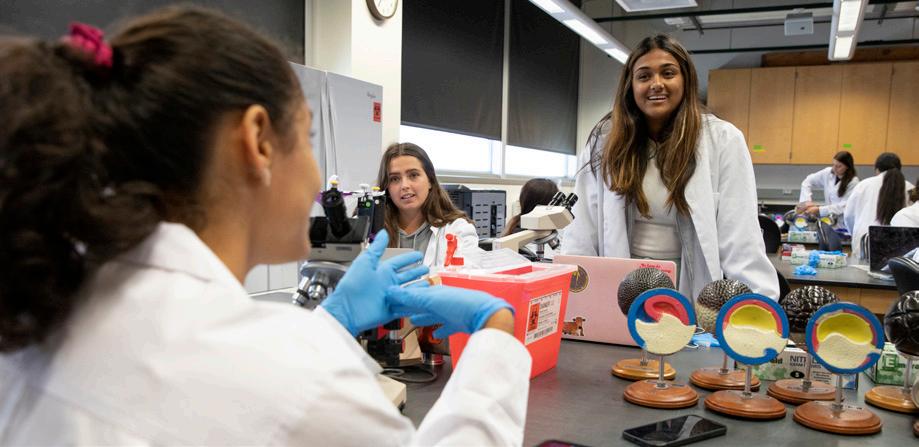
143
16 I Department of Biology • biology.uiowa.edu
Biology Building Iowa City, IA 52242-1324
Photos provided by Jill Tobin, CLAS Photographer








 Jodie Plumert, Ph.D. Interim Chair/Departmental Executive Officer (DEO)
Jodie Plumert, Ph.D. Interim Chair/Departmental Executive Officer (DEO)



 Andrew Forbes, Associate Professor
and
Maurine Neiman, Professor of Biology: $25,000 Diversity, Equity, and Inclusion (DEI) Supplement from the UI Office of the Vice President for Research (OVPR) for
parallel analysis
a snail-vectored
provides this award to principal investigators at the UI to advance their science while recruiting, retaining, and advancing UI students who support diversity, equity, and inclusion efforts in research.
Steven Green, Professor of Biology and Co-Investigator Ning Hu, Research Scientist
Green
Photo provided by Jill Tobin, CLAS Photographer
Andrew Forbes, Associate Professor
and
Maurine Neiman, Professor of Biology: $25,000 Diversity, Equity, and Inclusion (DEI) Supplement from the UI Office of the Vice President for Research (OVPR) for
parallel analysis
a snail-vectored
provides this award to principal investigators at the UI to advance their science while recruiting, retaining, and advancing UI students who support diversity, equity, and inclusion efforts in research.
Steven Green, Professor of Biology and Co-Investigator Ning Hu, Research Scientist
Green
Photo provided by Jill Tobin, CLAS Photographer




 Bryan Guevara (Neiman Lab)
Linda and Rick Maxson
Bryan Guevara (Neiman Lab)
Linda and Rick Maxson













 Adrianna Caro
Christopher Youngstrom
Rosemary Lee Krishna Nukala
Adrianna Caro
Christopher Youngstrom
Rosemary Lee Krishna Nukala












 Emily Hirsch Shulin Liu
David Steffen
Guerin
Brown
Maria F. Valdes Michel
Kelley Withers
Sydney Arlis
Briante Najev
Jinye Liang
Emma ThornburgSuresh
Tara Hicks
Athena Kvamme
Chelsea Higgins
Office of the Vice President for Research DEI Supplement Award
Emily Hirsch Shulin Liu
David Steffen
Guerin
Brown
Maria F. Valdes Michel
Kelley Withers
Sydney Arlis
Briante Najev
Jinye Liang
Emma ThornburgSuresh
Tara Hicks
Athena Kvamme
Chelsea Higgins
Office of the Vice President for Research DEI Supplement Award





































 Joel Sharbrough
Nick Eginoire Talitha Ford
Joel Sharbrough, a former Biology graduate student, received a five-year, $1.2 million CAREER Award in 2022 from the National Science Foundation to lead a cutting-edge plant genomics research project. Dr. Sharbrough received his Ph.D. in Integrated Biology from the University of Iowa in 2016 under the direction of Maurine Neiman, Professor of Biology. He has been an Assistant Professor in the Department of Biology at the New Mexico Institute of Mining and Technology (NMT) since
Joel Sharbrough
Nick Eginoire Talitha Ford
Joel Sharbrough, a former Biology graduate student, received a five-year, $1.2 million CAREER Award in 2022 from the National Science Foundation to lead a cutting-edge plant genomics research project. Dr. Sharbrough received his Ph.D. in Integrated Biology from the University of Iowa in 2016 under the direction of Maurine Neiman, Professor of Biology. He has been an Assistant Professor in the Department of Biology at the New Mexico Institute of Mining and Technology (NMT) since









